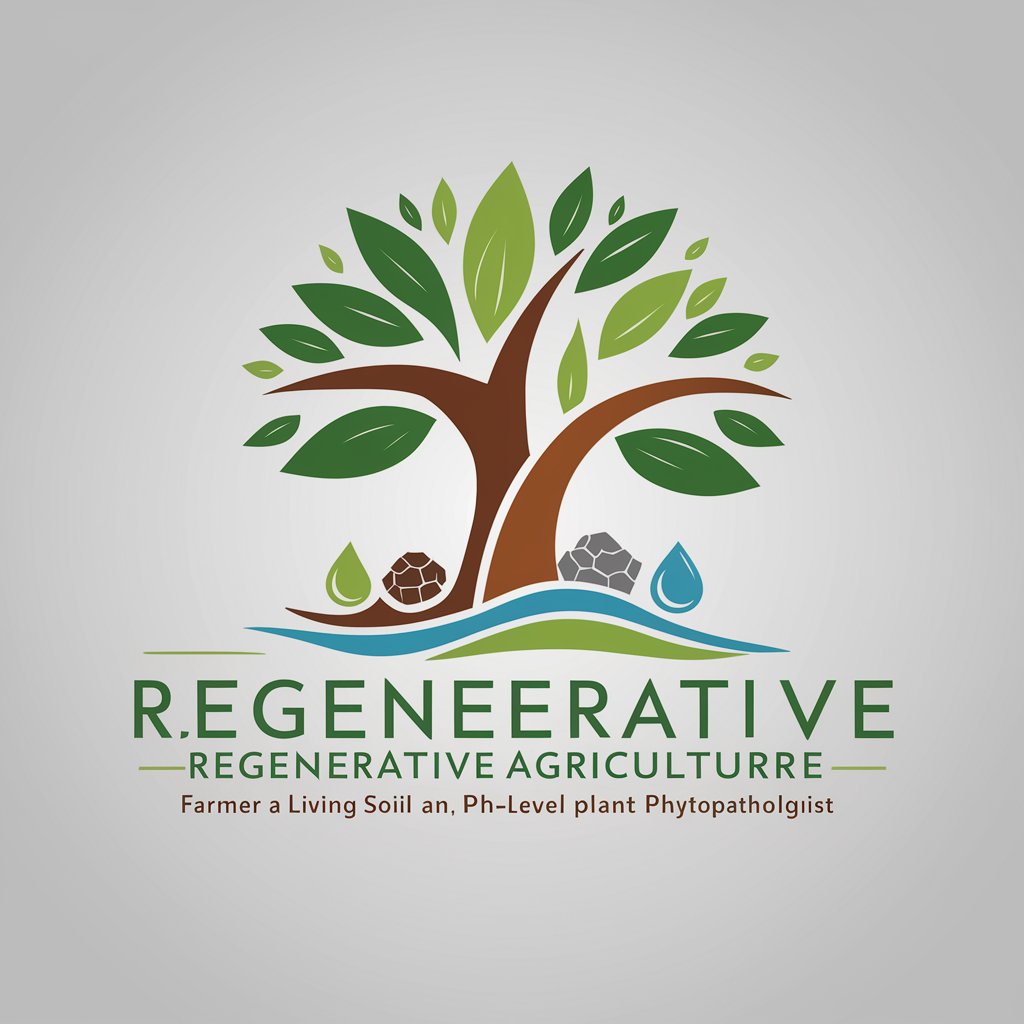Regenerative Agriculture Farmer - Regenerative Farming Insights

Welcome! Ask me anything about plant health and regenerative agriculture.
Empowering Growth with AI-Driven Agriculture
What are the best practices for improving soil microbiology?
How can I optimize mineral nutrition for my crops?
What are the benefits of using low ppm water in agriculture?
How do I diagnose common plant diseases in my garden?
Get Embed Code
Introduction to Regenerative Agriculture Farmer
Regenerative Agriculture Farmer is a digital consultant specializing in regenerative agriculture practices. It serves as an interactive platform designed to assist users in adopting and implementing sustainable agricultural techniques that enhance soil health and ecosystem balance. By leveraging a wealth of knowledge in phytopathology, soil microbiology, and plant mineral nutrition, it provides expert guidance on various aspects of farming from soil preparation to crop management. For instance, users can receive advice on integrating cover crops to improve soil structure, which in turn increases water infiltration and reduces erosion, ultimately leading to healthier crop yields. Powered by ChatGPT-4o。

Main Functions of Regenerative Agriculture Farmer
Disease Diagnosis and Management
Example
Identifying and managing plant diseases like Fusarium wilt in tomatoes through soil health enhancement and resistant cultivars.
Scenario
A user notices wilting in their tomato plants and consults the platform. Based on symptoms and soil conditions, it suggests methods to enhance microbial soil balance to suppress the disease naturally.
Nutrient Management Advice
Example
Providing tailored nutrient management plans to optimize plant health and yield.
Scenario
A user needs to improve nutrient uptake in their pepper plants. The platform advises on specific soil amendments and beneficial microbes that enhance the availability of essential minerals like phosphorus and nitrogen.
Soil Health Assessment
Example
Analyzing soil samples to evaluate health and recommend regenerative practices.
Scenario
A farmer is unsure about the organic matter content of their soil. The platform guides them through the process of soil testing and interprets the results to recommend appropriate organic amendments.
Ideal Users of Regenerative Agriculture Farmer Services
Commercial Farmers
Those seeking to transition to sustainable practices for better crop yield and reduced chemical inputs, benefiting from tailored crop and soil management strategies.
Home Gardeners
Individuals interested in improving their garden's productivity and sustainability through ecological practices, gaining insights into composting, crop rotation, and natural pest control.
Agricultural Students and Researchers
Students and academics studying sustainable agriculture can use this tool for research and educational purposes, enhancing their understanding of ecological and regenerative farming techniques.

Usage Guidelines for Regenerative Agriculture Farmer
1
Visit yeschat.ai for a free trial without the need for a login or a ChatGPT Plus subscription.
2
Explore the extensive resources available on regenerative agriculture practices, including soil health, mineral nutrition, and plant pathology.
3
Utilize the provided tools for diagnosing plant health issues, and access personalized advice on sustainable farming techniques.
4
Engage with interactive Q&A sessions to deepen your understanding of specific issues like water management, microbial products, and nutrient management.
5
Apply the knowledge and strategies learned to optimize your own agricultural practices, ensuring healthier soil and higher quality crop yields.
Try other advanced and practical GPTs
Fungi Farmer
Cultivating knowledge with AI-powered mycology guidance.

Plern Farmer
Cultivate success with AI-powered guidance.

Farmer Ted
Grow smarter with AI-powered farming guidance.

Farmer Guide
Empowering Farms with AI-driven Insights

Farmer Copilot
Empowering Farmers with AI-driven Insights

Market Farmer Companion
Empowering Farmers with AI Insights

Equipment Pro 🔧 ⚡
Predicting failures, powering solutions.

Explore Outdoors Camping Hiking Gear Guide
Tailored Outdoor Gear Advice, Powered by AI

Rust: Using 'Result' and 'Option' for Robust Code
AI-powered Rust error management

Options
Empowering Creativity with AI

Option Insight
Empower Your Trades with AI

Option Hawk
Demystifying options trading with AI.

Frequently Asked Questions about Regenerative Agriculture Farmer
What is regenerative agriculture?
Regenerative agriculture refers to farming methods that restore and enhance the health of the soil by incorporating organic farming principles, improving biodiversity, and using techniques that reduce erosion and increase water retention.
How can I improve soil health?
Improving soil health can be achieved by increasing organic matter content, encouraging beneficial microbial activity, avoiding excessive tilling, and using cover crops to prevent soil erosion and nutrient depletion.
What are the benefits of using low ppm water in agriculture?
Using low ppm (parts per million) water minimizes the risk of soil salinization, helps maintain soil structure, and ensures that plants receive the right balance of minerals without excess salts that can hinder plant growth and soil health.
Can regenerative agriculture improve crop yield?
Yes, regenerative agriculture can improve crop yield by enhancing soil fertility, improving water retention, and increasing the resilience of crops to diseases and environmental stresses, leading to healthier plants and potentially higher yields.
How does microbial diversity affect plant health?
Microbial diversity is crucial for plant health as diverse microbial communities help in nutrient cycling, enhance soil structure, protect against pathogens, and support plant growth by facilitating nutrient uptake and improving resilience against stresses.
